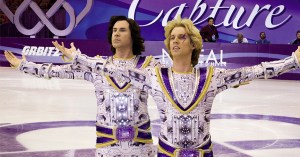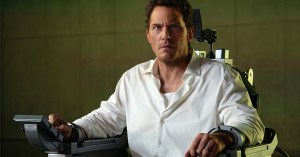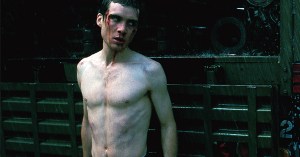Five Favorite Films with Rob Cohen
The Action Film Director Discusses the Films that Inspired Him
It can be fascinating learning what films inspire the filmmakers who inspire us. In this instance, action film director Rob Cohen imparted to us five of his favorite films, some of which helped to manuever him towards a career in filmmaking. His The Fast and the Furious brought the once popular car-race genre back to the forefront of action films, and on Jan. 23, he’ll offer his take on another classically popular genre, the stalker-suspense film, with The Boy Next Door, starring Jennifer Lopez and Ryan Guzman. So hearing him discuss his favorite films elucidates why he jumped into making the types of movies that have made him famous. Do any of his choices affect you the same way?
Gone in 60 Seconds (H.B. Halicki, 1974; 38% Tomatometer)
I like films that really break every rule, where the director, writers, producers have gone out, they’re just going, “We don’t give a f— what the hell has happened in other movies, or how other movies were written, or other movies were shot. We’re just going to do it our way.” And those movies not only tickle my fancy, but they always give me a lot of courage when I should have to do something to go, “You know what? Be more like that. Don’t listen so much to the popular wisdom or the collective wisdom, the rules.” And that’s one of the reasons I’m so proud of The Fast and the Furious. It’s because nobody gave a s— about the movie except me and the cast, and so we didn’t hear anything. I just did what I wanted to do. I was very much inspired by the original Gone in 60 Seconds, but the H.B. Halicki version, not the other version. You know, because that guy was staging car chases on the Long Beach freeway with no permits, no anything [laughing] and he was clipping telephone poles and doing all sorts of stuff that was just so balls-to-the-wall. H.B. Halicki was a junk dealer who wanted to be a movie director. And he financed, wrote, directed and starred in the original Gone in 60 Seconds. That was such an outrageous thing that it stimulated me in many, many different ways.
Mad Max 2: The Road Warrior (George Miller, 1981; 100% Tomatometer)
Same with my friend George Miller’s Road Warrior. When I first saw that in Westwood, I was like, “OooooK, there is a whole world beyond Hollywood that is sort of significant in this movie, that has a set of rules about gasoline as the ultimate currency that is both metaphorical and so out-of-the-box.” And the vehicles, the way George did it, the stunning performance of young Mel Gibson. I can remember the visceral impact that it had on me and I’m really looking forward to Fury Road now. I’m sure it’s going to be amazing.
Pulp Fiction (Quentin Tarantino, 1994; 94% Tomatometer)
After Gone and Road Warrior is Pulp Fiction, which I consider a perfect movie. I consider it a pitch-perfect movie. I’ve gotten to the point now where I pray to not come across it while channel surfing because, if I see five frames of it, then I have to sit and watch the rest of it. I’m now up to something like 30 or 40 times I’ve seen it. I just love that movie and all its dimensions, its crazy story structure, Quentin’s just brilliant dialogue, and the kind of mix of style and atmosphere with these memorable, memorable characters. Pulp is definitely one [of my favorites], although anything Tarantino would be good with me.
True Romance (Tony Scott, 1993; 92% Tomatometer)
I love Tony Scott’s True Romance. Tony was a good friend of mine and I miss him every day. That movie was not only, in my opinion, his best movie, that movie changed movies. It changed the way movies looked and, again, I think that script was written by Quentin.
Yeah, it was. But I don’t believe he had much involvement in it after that.
No, I don’t think he did. But Tony took that sort of subversive script and created a thing of such visual beauty and such compelling characters. You know, I gave Christian Slater his first leading role in The Legend of Billie Jean when he was 13.
I love that movie!
Oh! Thank you! [laughing]. [One of] Kerr’s favorites!
I love that movie, are you kidding me? I used to watch that over and over again, when I was young.
If you put that as one of your favorite films…
Oh it’s probably up there. I still go around singing “Invincible” to myself whenever I think about the movie, and vice versa.
Hey, fair is fair. And Monster Squad. I have my cult films.
Irréversible (Gaspar Noe, 2002; 57% Tomatometer)
Another one that I was very inspired by and touched by in all its ugliness and brutality, but its daring story structure, was Gasper Noe’s Irréversible, which is an odd one, but I just found the idea of starting at the end and telling it backwards as such a conceit. And the world it took you in, and the way it took you in, I felt that was something new that I’d never seen before.
It’s a journey through hell, starting at the end and working backwards to the beginning. So it’s sort of Paris’ underground, and it has a rape scene in it of Monica Belluci that’s one of the most frank, most brutal… You know, people kid about rape, you just say, “Yeah, I think you should watch this movie and see what rape really looks like. You should see how violent and terrible it is and then you’ll not make any jokes anymore.” It’s so balls-out, this film. It’s so unafraid. It’s so in-your-face. It’s one of those movies that, once you see [it], you will never forget it, and it keeps coming back to you and back to you. It’s not necessarily a pleasant thing, but it was definitely a filmmaker who said, “I don’t give a f— what anyone thinks. Anybody. Not the critics, not my friends, not the finance producers, nobody. I’m just going out to tell my story the way I want to tell it.” Vincent Cassel is so great in it, and Belluci. It’s really a very powerful movie.
Where are your light-hearted comedies, Rob?
Well then I start sounding like a geek, you know? I love Preston Sturges. The Lady Eve is one of the most wonderful high-style comedies. My comedic taste runs sort of to that zone which, after the era of Judd Apatow, we’re not doing that anymore. Nobody’s doing the high styled sophisticated comedy.
The Boy Next Door opens Jan. 23, 2015, in wide release.







